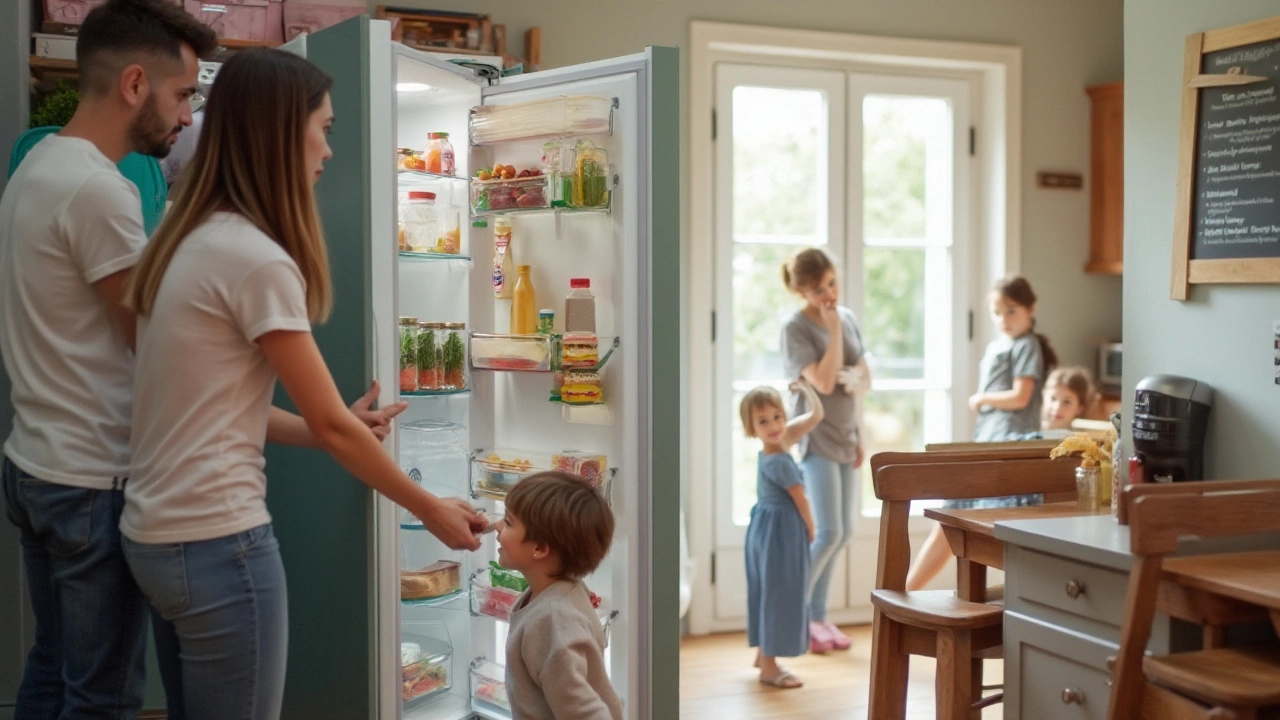Living in Wellington, where the scenic coastlines meet a bustling urban lifestyle, having a reliable freezer is a blessing. It stores our essentials and keeps those midnight ice cream cravings satisfied. But how long should we expect these appliances to last, and what can we do to ensure they serve us well over time?
The lifespan of a freezer is typically around 10 to 20 years. Its durability can depend on various factors, including how it's maintained and the environment it's kept in. Regular upkeep and timely repairs are key to extending a freezer's life.
This article provides insights into the factors that influence a freezer’s longevity and offers practical maintenance tips to maximize your appliance’s lifespan. From recognizing early signs of issues to knowing when it's time to consider a replacement, we’ve got you covered.
- Understanding Freezer Lifespan
- Factors that Affect Freezer Durability
- Signs Your Freezer Needs Attention
- Regular Maintenance Tips
- Upgrading vs Repairing
- Eco-Friendly Disposal Options
Understanding Freezer Lifespan
The life expectancy of a freezer is something many of us take for granted until we discover a pool of thawed peas on the kitchen floor. Typically, a home freezer is designed to last anywhere from 10 to 20 years, but the variation can be vast depending on numerous factors. Among households, this appliance becomes an unsung hero, tirelessly keeping our culinary treasures safe and sound. Yet, what defines this lifespan is a mix of the freezer's make and model, how it's used, and crucial maintenance routines. When manufacturers promise longevity, they base these estimates on average conditions, assuming that the freezer resides in a balanced indoor climate without undue exterior stresses. But what really determines if a freezer reaches its potential or spirals into an early demise?
Manufacturers build these machines to endure cold cycles and constant activity, with moving parts like compressors and fans doing most of the heavy lifting. The quality of electronic parts and motors play a significant role. Freezers that boast solid engineering and high-grade materials often outlive their less rugged counterparts. It's a classic case of you get what you pay for—premium appliances tend to stick around longer. However, maintenance is the true game-changer. Those who regularly check seals, defrost as needed, and keep coils free of dust often enjoy a reliable freezer for years beyond the average.
Yet, even with the best intentions, life throws curveballs. For example, location matters. A freezer nestled in a hot, muggy garage works harder, consuming more energy and potentially shortening its life. Positioning plays a role too; a unit crowded close to the wall or near a heating vent can suffer from insufficient airflow, causing it to overwork. Additionally, more mundane factors, such as how frequently the door is opened, directly influence lifespan. Every peek inside is an opportunity for cold air to escape, prompting the freezer to compensate by working harder. An interesting tidbit: keeping a well-stocked freezer can actually help maintain its efficiency. The frozen mass inside stabilizes the internal temperature during those door-open moments.
According to Consumer Reports, "Freezers may last roughly on par with refrigerators, which tend to operate for around 13 years." However, these broad estimates hide the reality that many factors are within your control, which can prolong or cut short your freezer's functional life. By following a few prudent maintenance guidelines, homeowners can ensure their appliances get closer to the higher end of their life expectancy range.
Moreover, technological advances are reshaping what we expect from these appliances. Modern freezers with smart features and energy-efficient designs not only promise lower utility bills but can also signal when maintenance checks are needed. These sophisticated additions can boost the lifespan and performance if properly utilized. Here, technology isn’t just a bell and whistle; it's a pivotal tool in navigating ownership with ease. Ultimately, understanding a freezer's lifespan involves an intertwining appreciation of technology, thoughtful maintenance, and the occasional environmental adjustment, ensuring your icy companion remains your steadfast kitchen ally as long as possible.
Factors that Affect Freezer Durability
When it comes to the freezer lifespan, several elements come into play that determines how long your appliance will keep things nice and chilly. One factor is the temperature of the environment where your freezer is placed. For instance, if it's in an uninsulated garage, the extreme heat or cold can cause it to work overtime, ultimately wearing it down faster. Another crucial factor is the ventilation around the appliance. Freezers need adequate space to 'breathe', meaning there should be a few inches of space between the wall and the freezer back to ensure proper air circulation.
The way we use the freezer dramatically impacts its durability as well. Constantly opening the door and leaving it open for long periods allows warm air to enter, forcing the freezer to work harder to maintain its internal temperature. This extra strain can shorten its lifespan. It's not just usage habits that matter; how your freezer is loaded also plays a critical role. Overloading or improperly organizing items can obstruct air vents, causing the compressor to run continuously, which leads to premature wear and tear.
Power surges are another unseen enemy that can greatly affect the durability of your freezer. These surges can impair the appliance's electrical components, even if they're subtle enough to go unnoticed initially. Investing in a surge protector can be a wise decision, as it might just be the shield your freezer needs. According to Consumer Reports, the electricity your appliance uses could shock you in more ways than one if unprotected. Finally, regular maintenance is crucial. Simple tasks like cleaning the coils twice a year or ensuring the seals around the door remain intact can extend the life of your appliance tremendously.
"Proper maintenance and vigilant usage practices can effectively extend your freezer's life expectancy," notes the Appliance Alliance Group, emphasizing the little things that make a big difference.
Once these practices become routine, you'll likely find that your freezer remains a stalwart companion in your kitchen or storage area for many more years than expected. Ensuring the freezer repair happens at the first sign of trouble can also prevent small issues from ballooning into bigger problems. You see, all these factors combined require more than just initial care but ongoing attention and adjustment in your daily habits to preserve the longevity of this essential household appliance.

Signs Your Freezer Needs Attention
Your freezer might seem like the silent hero of the kitchen, tucked away in the corner doing its vital work without much fuss. Yet, like any hardworking device, it sends signals when it's under duress or facing a potential breakdown. Identifying these signs early can help you avoid freezer repair expenses that might otherwise go unnoticed until it's too late. A key sign your freezer might be crying out for attention is excessive frost buildup. If you're noticing a rapidly growing iceberg around your frozen peas, it could be an indication of faulty door seals. The rubber gaskets around the freezer door often wear out due to age or frequent use, letting in warm air and causing your appliance to work overtime just to maintain temperature.
Another clue that something’s amiss is a sudden spike in your electricity bills. Your freezer consumes energy to keep its contents cold, but if it’s constantly running without cycling off, that’s a red flag. This could mean the compressor isn’t working effectively, or there’s an issue with the evaporator fan. The compressor, essentially the heart of the freezer, should occasionally turn off once optimal temperature is maintained. Continuous operations point towards underlying issues that need attention. Keeping an eye on these signs not only helps extend the life of the appliance but also ensures your frozen goods remain in tip-top condition.
Strange noises are another telltale sign. Freezers aren't completely silent, but if yours is groaning, clicking, or making much louder hums than it used to, that’s worth investigating. Unusual sounds might point to issues with the evaporator fan motor or the motor that runs the ice maker, if your model is so equipped. The fan motor, in particular, plays a crucial role in evenly distributing the cold air within the freezer. If it's not functioning properly, it might not just be noisy; it could lead to uneven cooling or worse, a complete shutdown.
Of course, nothing beats a good old-fashioned inspection now and then, especially when your trusty freezer starts issuing warm-food alerts. If you’re opening your freezer only to be met with evenings of defrosting dinner instead of instant meals you expect, your unit might not be cooling adequately. This could be caused by various reasons ranging from a clogged defrost drain or a thermostat set too high, to more serious issues like a leaking refrigerant. Proper diagnosis usually requires a bit of expertise, so calling in a professional might be the prudent approach.
If you’re unsure whether it’s time to call a professional, Home Improvement expert Bob Vila advises, “If you notice your freezer’s not as frosty as it should be, and your perishable items are starting to thaw, you should contact a technician sooner rather than later.”
The odor is another sensory clue your freezer might need attention. Accumulated spills or expired food particles can create an unpleasant smell, which usually points to blocked vents or deteriorated seals. When airflow is reduced or uneven, not only does it lead to poor performance but it can also invite mold and mildew, which bring additional health risks.
Sometimes the signs are subtle, like a persistent wet spot on the floor nearby. This could indicate a problematic defrost drain or perhaps a cracked drain pan. Both issues require prompt attention to avoid further damage not just to the freezer but potentially to the surrounding area of your kitchen as well. Vigilance over such symptoms can keep your trusty freezer in service for years beyond its expected lifespan.
Regular Maintenance Tips
When it comes to keeping your freezer in top shape for years, a little regular maintenance goes a long way. Whether it's a compact model tucked away in a corner or a grand unit standing proud in the kitchen, freezers demand more than the simple task of chilling our food. One of the most critical parts of freezer maintenance is ensuring it remains clean and organized. Spills and crumbs can lead to frost buildup, making the unit work harder than it should, and impacting its overall efficiency. Experts suggest adopting a quarterly routine to empty out the contents and give the shelves and drawers a thorough wipe down. This simple act not only promotes hygiene but also gives you a chance to check for expired items, clearing space and helping maintain even cooling within the unit.
Another key aspect is the condition of the door seals or gaskets. Over time, these can wear out, permitting cold air to escape and making the freezer work overtime. A good test to determine the health of your gaskets involves the 'paper test.' Simply close a piece of paper in the door and attempt to pull it out; if it slips out easily, the seal may need replacement. Addressing this promptly can save a significant amount on energy bills. Trimming back shrubbery or removing objects too close to the appliance can further promote efficient cooling and even temperature regulation.
Ventilation is vital for your freezer's long-term health. Ensuring the appliance is positioned with adequate space around it can prevent overheating, especially in direct sunlight, which can severely shorten the lifespan of your appliance. A rule of thumb is to leave about an inch behind and several inches on each side, allowing air to flow freely and cooling to happen without unnecessary strain. Dealing with common frezer repair tasks like unclogging the defrost drain can prevent ice buildup problems. Following careful instructions in the user manual can guide you on how to handle such minor repairs efficiently.
Beyond the mechanics and the physical environment, consider the freezer's workload. Overloading not only hinders its ability to cool effectively but also puts extra pressure on the motor, leading to wear and tear. Regularly defrosting the unit, as required, can prevent frost buildup that can compromise the efficiency of the cooling coils. Interestingly, well-maintained freezers have been known to consume significantly less power compared to their neglected counterparts. According to Consumer Reports, regularly serviced units have lowered energy consumption by up to 20%, a substantial saving in long-term operational costs.
Lastly, consider investing time in checking condenser coils. These components play a pivotal role in heat release, and if dirt-clogged, they force the compressor to work harder, leading to higher energy usage and a shorter lifespan for the freezer. Using a coil brush or a vacuum attachment, gently clean the coils every six months. Whether you're looking to extend your freezer's life or reduce energy consumption, these steps are crucial. Pay attention to noise levels as well; unusual sounds can be an indication of underlying issues, and consulting a certified technician as soon as you spot one is crucial.

Upgrading vs Repairing
The eternal debate between repairing an existing freezer and making an upgrade to a new model often depends on a variety of considerations, both practical and emotional. When your trusty old freezer starts to make odd noises or fails to maintain its chill, the first instinct might be to call in a professional. With freezers having an average lifespan of 10 to 20 years, many owners find themselves at this crossroads more than once. Let's delve into the practical and financial aspects to consider.
Firstly, cost is a significant factor. Repairs can be affordable if they involve minor fixes like replacing a thermostat or defrost heater. However, if the motor or compressor is on the fritz, the bill can skyrocket. On the other hand, upgrading to a new model could seem daunting upfront, but the savings on energy bills and improved efficiency might balance the expense over time. New freezers often come with advanced features that enhance convenience and user safety, a factor worth considering when contemplating an upgrade.
In deciding between upgrading and repairing, it's crucial to look at energy consumption. Older models tend to be less energy-efficient, which can lead to increased electricity costs. As per the U.S. Department of Energy, replacing a model from the 1990s with a new ENERGY STAR certified freezer can save you over $300 on energy bills over its lifespan. Newer models use less energy, create fewer emissions, and can take advantage of time-of-use energy pricing.
According to Tom Burton, an appliance repair expert with over twenty years of experience, “If your freezer is over ten years old and requires a repair that costs more than half its original price, you are better off investing in a new model.”
Assessing the environmental impact is also vital. Older freezers use refrigerants that are harmful to the ozone layer, whereas new models are designed to be environmentally friendly. By choosing to upgrade, you're not only potentially saving on costs but also contributing to a reduced carbon footprint.
Finally, consider reliability and peace of mind. A new freezer comes with warranties that provide a safety net for several years, while continuous repairs on an old unit can become a nuisance. There’s also the convenience factor to consider—new freezers feature innovations like adjustable shelves, advanced temperature control, and frost-free technology, making them appealing for a modern household. If any of these factors weigh heavily in your situation, then an upgrade might be the best course of action. Deciding between repair or upgrade is a personal decision but weighing in these factors can definitely make the road clearer.
Eco-Friendly Disposal Options
When a freezer finally reaches the end of its lifespan, disposing of it responsibly becomes an important task. Not only does this help the environment, but it also aids in the proper recycling of materials to reduce waste. Many components within freezers, such as metal shelves and plastic parts, can be repurposed when disposed of through eco-friendly channels. One of the most effective ways to dispose of a freezer is by reaching out to local appliance retailers or manufacturers. Often, they have programs in place to collect old appliances and ensure they are recycled properly. This may involve dismantling the freezer and separating recyclable materials from hazardous substances, such as refrigerants and foam insulation, which can be harmful if not handled correctly.
In many regions, there are also specialized recycling centers dedicated to appliance recycling. These centers have the necessary equipment and expertise to safely dismantle and recycle all parts of a freezer. For those seeking responsible disposal, checking government websites or local waste management services can provide information on nearby facilities. Additionally, some municipalities offer curbside collection services for large appliances, making it convenient to dispose of your freezer without contributing to landfill waste. It's essential to ensure these services have a commitment to sustainability, as the goal is to minimize environmental impact.
To add a personal touch, consider donating a functioning old freezer to charities or community centers. Many organizations are happy to receive large appliances, especially those serving lower-income families who might benefit from a freezer in good working condition. Donating is not only environmentally friendly, but it also provides a second life to an appliance that might otherwise be discarded. As stated by the Environmental Protection Agency, "Recycling and donation are effective ways to reduce the amount of waste sent to landfills and preserve natural resources."
“Proper recycling of appliances saves resources and energy, reducing pollution and greenhouse gas emissions,” emphasizes the Global Appliance Recycling community.This statement resonates with people who are keen on making environmentally conscious decisions, ensuring that even at the end of its life, a freezer continues to leave a minimal footprint.

